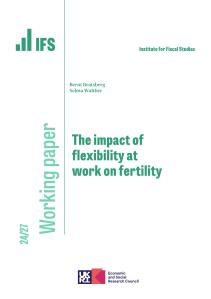Christine Farquharson, Senior Research Economist at the IFS said:
"Raising the caps on childcare support through Universal Credit will end an 18-year cash-terms freeze, which has seen the maximum amount that parents can claim lose almost 60% of its value in real terms. Cash-terms freezes are rarely good policymaking, so updating the value of these caps is certainly no bad thing. But Mr Hunt should not expect this change to move the dial on childcare expenses for most low-income families: the average family receiving childcare support through Universal Credit gets about £330 a month, less than half of the value of the cap for one child. Our estimates suggest that the number of families who will benefit is in the tens of thousands - compared to over 800,000 families who are eligible for support.
Changing the timing of childcare payments is potentially a much bigger deal. Up-front support with childcare expenses will mean that low-income families moving into work will no longer have to pay for their first month of childcare out of pocket, which leaves the average family with a 1- or 2-year-old worse off by about a third. But there are risks here too: payment in advance means that a family's changing circumstances could leave them having to repay support, and opens DWP up to fraudulent claims. The government will need a strategy for managing these risks.
But overall, a serious approach to tackling some of the issues with childcare support in Universal Credit is welcome, and overdue. Spending on childcare support through the benefits system has fallen by two thirds since 2010, and just a quarter of eligible families with a pre-school child take up the support on offer. If these changes make it easier for low-income families to access and use this set of subsidies, that will go some way to easing the transition into paid work for parents."









